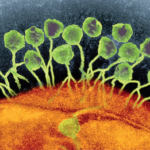At the height of the pandemic, when hospitals were packed with COVID-19 patients and people suffered feelings of isolation due to quarantine, many were desperate for a silver bullet to speed the return to normalcy. This sentiment, along with the rampant spread of misinformation online, fueled the promotion of “miracle cures” people claimed would stop coronavirus in its tracks. The most popular of these were hydroxychloroquine and ivermectin, but why were people so convinced that these drugs could cure COVID-19? Georgia representative Marjorie Taylor Greene erroneously claimed that ivermectin “won the Nobel peace prize,” while a group of senators condemned biomedical scientists for “overtly discourag[ing] the use of cheap and widely-available early treatments like ivermectin.” Why, they argued, would we hold out for new treatments when existing drugs are safe and effective?
The main problem with this argument is that these drugs demonstrate efficacy against other diseases, not COVID-19. Ivermectin was demonstrated to resolve nematode (also known as roundworm) infections by Satoshi ?mura and William Campbell, who won the Nobel Prize in Physiology or Medicine (NOT the Peace Prize) in 2015. This discovery was a major milestone in medicine because roundworms such as the hookworm infect around a billion people globally.
Ivermectin acts on nerve cells to impede muscle relaxation and paralyze roundworm parasites. Viruses such as the one that causes COVID-19 are little more than DNA or RNA in a protein coat and, of course, lack a nervous system. Thus, the studies that demonstrated the efficacy of ivermectin in treating roundworm infections suggest nothing about its efficacy against COVID-19. Similarly, the precursor to hydroxychloroquine was approved for the prevention of malaria in 1947. Malaria, like roundworm, is caused by a parasite.
Nevertheless, many scientific studies have searched for a possible use for hydroxychloroquine and ivermectin in the treatment of COVID-19. The overwhelming majority of these found no effect of these drugs on COVID-19 outcomes. However, a few research articles reported that ivermectin effectively treated coronavirus, which some news outlets seized on while ignoring the much larger body of evidence demonstrating no therapeutic effect. A recent meta-analysis revealed that the studies demonstrating this link were all conducted in regions with a high prevalence of threadworm, a type of roundworm. None of these studies treated roundworm infection status as a confounding variable (or a variable that causes the appearance of an association between two variables where none exists). In these studies, COVID-19 patients who received ivermectin took no other drugs for theirviral infection, while those who did not take ivermectin were given other drugs used to treat COVID-19 early in the pandemic. Among these are steroids, which reduce inflammation that causes much of the pathology in COVID-19 but elevate the risk of a severe and lethal form of threadworm infection. Therefore, patients coinfected with COVID-19 and threadworm who took steroids may have become more ill due to severe threadworm infection than those who took ivermectin, creating the illusion that ivermectin is effective against COVID-19. Additionally, coronavirus depletes a type of immune cell called eosinophils, which are critical in combating roundworms, also contributing to threadworm hyperinfection.
In the US, where threadworm prevalence is low, no effect of ivermectin on COVID-19 has been observed. Taking any drug, including ivermectin, can be dangerous when used improperly. When doctors refused to prescribe ivermectin to people who believed the drug could prevent COVID-19, many resorted to consuming ivermectin paste used to deworm livestock, which is far more concentrated than the dose demonstrated to cure roundworms in humans. As a result, reports of ivermectin poisoning increased three-fold, and veterinarians experienced an ivermectin shortage.
Hysteria over so-called miracle cures is nothing new – Clark Stanley’s Snake Oil Liniment, peddled as a panacea, was found in 1916 to contain no real snake oil and dubious medicinal value. Stanley was fined $20, the equivalent of $498 in 2021. As recently as 2021, televangelist and convicted fraud Jim Bakker advertised colloidal silver and other quack remedies for outrageous prices. Nor is poor science a new phenomenon: many scientific fields are currently experiencing a replication crisis, meaning a large proportion of experimental results published in those fields fail to be proven legitimate when other scientists attempt to replicate them. Both negligence in experimental design and deliberate fraud have been shown to contribute to this problem. The spread of misinformation is not harmless – it causes people to distrust experts and unknowingly endanger themselves and others. For example, although Andrew Wakefield’s claim of a link between the MMR vaccine and autism was proven false in 2010, many still believe this myth. As a result, vaccine hesitancy has led to a resurgence of many diseases previously thought to be eradicated. Researchers must work to earn back the public’s faith in science through reforms in training, experimental design, and the peer-review process. We as a society can also combat public health misinformation by verifying that sources are trustworthy – such as a .gov website or peer-reviewed journal – and evaluating conflicting information for bias and flaws in logic.
Featured Image: Ivermectin tablets seized by the Austrian Federal Ministry of Finance (Bundesministerium für Finanzen) Customs agency. Source Wikimedia Commons. Photo credit: BMF/Zoll. Licensed under CC-BY-2.0.
About the Author
Benjamin Phipps is a PhD candidate in the Department of Genetics at UGA. He studies factors that influence mosquito fecundity and malaria infection with Dr. Michael Strand. When he is not in the lab, Benjamin enjoys classical music, scary movies, and Latin American literature. He can be reached at benjamin.phipps@uga.edu.
- Benjamin Phippshttps://athensscienceobserver.com/author/benjamin-phipps/
- Benjamin Phippshttps://athensscienceobserver.com/author/benjamin-phipps/
- Benjamin Phippshttps://athensscienceobserver.com/author/benjamin-phipps/








